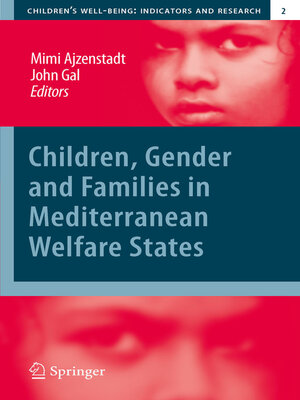Children, Gender and Families in Mediterranean Welfare States
ebook ∣ Children's Well-Being: Indicators and Research
By Mimi Ajzenstadt

Sign up to save your library
With an OverDrive account, you can save your favorite libraries for at-a-glance information about availability. Find out more about OverDrive accounts.
Find this title in Libby, the library reading app by OverDrive.



Search for a digital library with this title
Title found at these libraries:
| Loading... |
countries in this region have been particularly limited (for an exception to this, see Petmesidou & Papatheodorou, 2006). The underlying assumption in this volume is that despite the diversity of welfare states bordering the Mediterranean Sea, some interesting commonalities are shared by these nations. Indeed, in his contribution to this volume Gal has described these nations as belonging to an extended family of welfare states that share some common characteristics and outcomes, one of which is the role of the family. By bringing together case analyses of the welfare states in the Mediterranean which focus on children, gender, and families, we maintain that it is possible to shed light on aspects of social policy that do not necessarily emerge in most discussions of these issues in the literature. The rationale inherent in a volume that focuses on a group of welfare states is of course embedded in the welfare regime typology notion that has dominated much of the comparative social policy literature over the last two decades. The publication of Esping Andersen's seminal work, The Three Worlds of Welfare Capitalism in 1990 (and his related 1999 book), which distinguished between three welfare regimes, became a landmark for comparative work of social policies in various countries. Esping-Andersen regarded his typology as a useful tool for comparison between welfare states because it allowed "for greater analytical parsimony and help[s] us to see the forest rather than myriad trees" (1999, p. 73).






